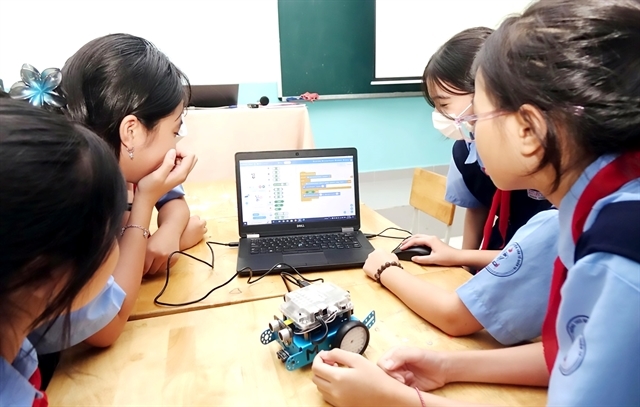Kindergarten teachers and kids are joyful on the inauguration of the Kindergarten 12 in District 4. (Photo plo.vn)
The sector has also successfully implemented major goals in the country’s Education Development Strategy, including improving knowledge, training human resources and nurturing talents to serve the country’s development and international integration.
On February 14, 2024, the United Nations Educational, Scientific and Cultural Organisation (UNESCO) recognised HCM City as a member of the UNESCO Global Network of Learning Cities, along with 63 other cities from 35 countries.
The recognition is a firm foundation for the city to strengthen international cooperation, promote lifelong learning, enhance international prestige, and boost investment attraction.
The city’s education development strategy from now to 2030, with a vision to 2045, outlines the promotion of digital transformation in education and training and the development of digital schools, smart schools and happy schools.
It also strives to develop the city into a centre for high-quality human resource training in the country and the ASEAN region.
The city’s education sector has achieved significant accomplishments in the field of digital transformation in education through strategic partnerships with international partners.
The modern digital school model was implemented based on advanced online management and learning platforms, enabling teachers and students to access the latest technologies.
In particular, artificial intelligence (AI) and big data played a crucial role in enhancing the effectiveness and quality of teaching while supporting the development of an intelligent education system.
The city’s education and training sector has implemented a set of standards for recognising digital schools in educational institutions, including digital institutions, digital facilities and infrastructure, digital data, digital human resources, digital governance and administration, and digital education.
The set of standards are used for evaluating and recognising educational institutions that meet the standards of digital schools.
The city is implementing the projects “50 Digital Schools” and “Digital Library for 50 Digital Schools” to celebrate the 50th anniversary of the Liberation of the South and National Reunification (April 30, 1975 - 2025).
The move is aimed at promoting digital transformation in educational institutions and improving the quality of education and training.
The sector has issued a set of criteria for Happy Schools, which is implemented by 100 per cent of educational institutions to create a safe, healthy, and friendly educational environment where students, staff, teachers, and employees are loved, respected, and understood.
It is expected that half of educational institutions in the city will meet the criteria by 2030.
 |
| Students at Nguyễn Văn Tố Secondary School in HCM City's District 10 study STEM (Science, Technology, Engineering and Mathematics) learning. (Photo hochiminhcity.gov.vn) |
Internationally integrated schools
The city began to pilot the model of advanced and internationally integrated schools at three high schools -Lê Quý Đôn, Nguyễn Hiền and Nguyễn Du - in 2015-2016 academic year.
The model was expanded to other levels of education. As of May 2024, the city has 59 educational institutions adopting the model of advanced and internationally integrated schools, including 26 kindergartens, 18 primary schools, 12 secondary schools, and three high schools.
With this model, the maximum number of students in kindergarten is 30 children a class, other levels of education are 35 students and below per class, and many criteria are stipulated by the city People’s Committee to ensure the quality of teaching of advanced and internationally integrated schools.
In its strategy for education development from now until 2030, with a vision to 2045, the city People’s Committee sets a goal that by 2030, each district and Thủ Đức City will have at least two schools at each level implementing the model of advanced and internationally integrated schools.
In addition, the city has at least 10 high schools with modern facilities and teaching quality that meet the criteria of high-quality, advanced and internationally integrated schools.
The city also aims to build four new high-quality high schools in Thủ Đức City and two schools in Bình Chánh and Củ Chi districts, covering an area of at least of five hectares a school.
It set many goals to achieve the highest levels such as 100 per cent of schools building smart schools, 100 per cent of students having access to modern learning spaces on digital platforms, and 100 per cent of learners and teachers having sufficient conditions to effectively access the 2018 General Education Curriculum, which shifts from content-based to competency-based education.
New classrooms
On April 9, the Kindergarten 12 in District 4 was inaugurated after one year of construction.
The new school, with a total cost of VNĐ36.6 billion (US$1.42 million), is part of a larger project to build 4,500 classrooms to celebrate the 50th anniversary of the Liberation of the South and National Reunification.
“The newly-built school with modern facilities brings joy to teachers, students and parents, making it much more convenient for teaching and learning,” said Huỳnh Lê Diễm Kiều, the school’s principal.
Previously, the old Kindergarten 12 consisted of one main campus and six satellite campuses. The facilities at the satellite campuses were degraded, making it difficult for children to study and teachers to teach, Kiều said.
Since the city People’s Committee approved the project to build 4,500 classrooms one year ago, localities have given a top priority to implement it.
It is expected that a total of 2,000 classrooms will be completed and put into use by the end of 2025, according to the department.
Director of the department Nguyễn Văn Hiếu said that the project helps develop the city’s school and education network, ensuring that 100 per cent of students study full-day programmes and the number of students per class meets the standards prescribed by school regulations at all levels and grades.